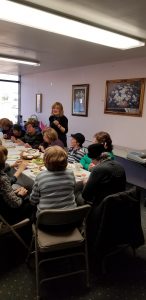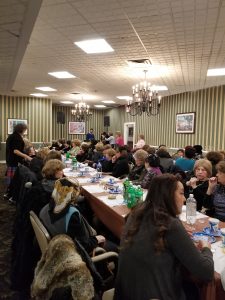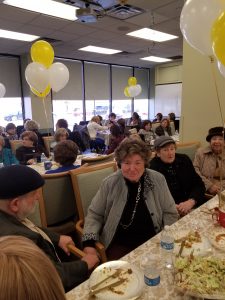The Heart and Work of Rizy Horowitz
The snow had not yet begun to fall on the Thursday afternoon when I joined a couple of hundred Holocaust survivors at Manhattan’s Museum of Jewish Heritage for a Kristallnacht commemoration and launch of the Yiddish CD my husband released in their honor.
It took me a while to enter the building, because every time I made it to the front of the security line, I allowed the elderly survivors – mostly women – to go ahead of me. But once I finally made it upstairs to the large ballroom that accommodated the event, I found a friend – a grandmotherly sort of woman I’d met at a hotel program earlier this year. I sat at her table and began the rounds of introductions with some of the other woman seated with us. They each exchanged names and basic get-to-know-you information, and they all ended with, “But you must meet Rizy.”
I already knew the woman to whom they were referring, Rizy Horowitz, director of Nachas Health and Family Network.
“Yes, I know Rizy,” I told the women.
“No, you don’t,” my friend answered. “You don’t know her. You don’t know what she does for us. Only a survivor can understand.”
20 years ago, Rizy Horowitz was offered a position at Nachas, the very first frum organization to have received a grant from the Claims Conference. Rizy accepted the job.
It was around that time that what Rizy refers to as the “Swiss money episode” came to light, when Swiss banks admitted to holding vast amounts of Jewish assets belonging to victims of the Holocaust. There was an enormous amount of paperwork to sort through in order to begin righting that unforgivable wrong, and that’s just what Rizy did.
“When I started, I was supposed to work two or three hours a day,” Rizy says, chuckling. Her position quickly morphed into a full-time job as she waded through piles of papers, made calls, and did all the legwork no one else seemed to want to do.
Rizy helped create a database of close to 500,000 Holocaust survivors eligible to receive reparations. But as she worked on their financial benefits, she realized something was missing. They needed more than just financial assistance. She began hosting events for survivors as well, the first of which took place on a sweltering summer day. The women who came were so eager to join her event that they showed up early and were waiting outside for the doors to open.
Under the leadership of Rizy, her partner Frumie Cisner, and their incredible team, Nachas quickly grew into a haven for Holocaust survivors, a place where they could find myriad means of assistance and a caring environment. A place where they were helped and respected.
Reparations
Thanks to Rizy’s efforts, large numbers of survivors continue to receive reparations despite the daunting bureaucratic hurdles involved.
“I’m good at networking,” she says when I ask her about her success. “And I’m very driven. I’ll do whatever it takes to prove that someone is a survivor.”
There was the case of a woman originally from Belgium who had been in Casablanca during the war. The German government claimed that they had no camps near Casablanca, and therefore denied her case, but Rizy would not take no for an answer. She got to work, doing extensive research until she found evidence of not one but numerous concentration camps in the region.
Thanks to Rizy’s work not only the woman in question, but many others, were also able to receive reparations. Sometime later, Rizy’s husband visited Israel, where he was picked up from the airport by a man originally from Morocco. They got to talking, and in conversation the senior driver mentioned that he received money from the Claims Conference. “That’s because of my wife!” exclaimed Rizy’s husband.
One woman was unable to prove that she was a survivor. Rizy dug through files and archives until she found records that proved her place of birth, the date she entered the ghetto, and on which train she went to the concentration camp.
In another case of unproven origin, Rizy visited Yad Vashem where she found contact information for the brother of the woman in question. She had a head researcher at Yad Vashem speak with him. The woman then went to search through a computer elsewhere in the museum and emerged with a pile of papers that documented the survivor’s exact location in the Budapest ghetto and the date she left.
About two years ago, during the throes of Venezuelan protests, a man traveled to New York and told the team at Nachas that reparation checks were being stolen from survivors’ mailboxes in the ravaged country. Rizy brought him before the Claims Conference to plead his case, which led to the opening of a branch there to help the large number survivors in the country.
Has she ever had a case where she did not succeed in obtaining reparations? “Sometimes people are too wealthy to receive it,” Rizy says. “Most of the time that’s not the case and we are successful.”

Building a Connection
For Rizy and her team, working through applications is just a small part of what they do. Their work, she says, is more about building relationships. “When ‘my’ survivors walk into my office, I close the door and ignore everything else. They show me their tattoos, and tell me their stories. For many, it’s the first time they’ve ever shared or discussed those stories.”
Growing up, Rizy was fascinated by the Holocaust, a subject about which she knew almost nothing. Her mother is a survivor, but like so many others during that era, she never discussed her experiences. “She was never truly happy, and I never understood why,” reflects Rizy. “But no one spoke back then. I went to Bais Yaakov of Williamsburg, and all our parents were survivors, but it was like a big, dark secret that no one mentioned. My father was a Canadian, so on his side of the family we had uncles, aunts, and cousins, which was a rarity. Almost no one had extended family. Everyone used to tell me, ‘You’re so lucky.’”
One day, Rizy found her mother’s papers from Wiedergutmachung and read her report. It was her first real window into her mother’s life, something that had always been a mystery to her. As her awareness grew, so did her desire to help.
“It’s become an obsession to do whatever I can for survivors,” said Rizy. “They are all family. I try to make Nachas their second home.”
Twice a week, Nachas offers exercise classes. There is also a regular shiur and a pizza party. Thanks to the generosity of another organization, Nachas has been able to send a group of survivors on a four day, five night vacation to Oppenheimer’s Hotel in Fleischmanns, New York. “One man cried like a baby when I told him about the vacation,” Rizy says. “He told me that since he lost his wife, he spent every day just sitting by the window.”
Before Rosh Hashanah, Nachas arranged for groups of survivors to visit the Lubavitch Rebbe’s Ohel and also to do tashlich, as per their request.
Whether it’s a winter coat, a problem with the bank, or an empty refrigerator, Rizy and her team will do whatever it takes to take care of the survivors who are part of their network. One woman had unsuccessful eye surgery that left her blind. A sponsor was aranged, and she received a pair of computerized glasses that are able to vocally identify the items pointed to by the wearer.
Then there was the woman – dignified, beautiful, yet impoverished – who was found digging through garbage cans for food. Rizy went door-to-door to collect money for her.
In the spring, when Hungarian survivors have yahrtzeit for those who were deported, Nachas hosts a Day of Remembrance, an event that has been covered by Channel 12 News and the New York Post. Each year, they honor various people who made a difference during the war, such as Raoul Wallenberg and Mike Tress, along with diplomats representing countries who were kind to the Jews during that devastating period. “Our chazzan, who recites Kel Malei at the event, has said that he feels surrounded by neshamos when he sings there,” says Rizy.

Dealing with Survivors
Many of the survivors Rizy works with have incredible energy. “When we do parties, they yell that there’s not enough room to dance,” she says. “They all look out for each other, and rally around each other when a problem arises.”
Their emunah inspires her on a daily basis. “I ask them sometimes, why did you remain a Jew after all you went through? They all answer the same thing: that the last thing their parents told them was to remember who they are and where they came from. This stays with them for life.”
Food, something they were severely deprived of during the war years, is a hot-button issue with survivors. “It’s a very important part of their lives,” says Rizy, who once opened the refrigerator of a survivor and found that it was packed with spoiled food. “We got a grant from the Eli Weisel Foundation that allows us to serve supper three times a week. Those suppers are very popular around here.”
For the children of survivors, the many levels of additional support offered by Nachas for their parents can be a lifeline. “Holocaust survivors never had the opportunity to watch a parent grow old,” says Rizy. “They are challenged generationally, and this manifests itself into neediness as they grow old. They don’t realize what they are doing to their children. One woman – a mother and wife – told me that her mother expected her to sleep with her every night, and she just couldn’t manage.”
What’s it like working daily with members of the generation that is simultaneously strong and fragile, one that we hope will be here forever but recognize that impossibility? “I take it one day at a time,” says Rizy. “I don’t go to the levayas; I can’t handle them. At night when I go to sleep, a movie plays in my head of all the survivors I once knew who aren’t with us anymore. I tell myself that they’re on vacation.”
She adds, “You can’t think about the fact that they won’t be around forever. One survivor told me, ‘We’ll dance together before Moshiach.’ And that’s what I tell myself as well.”
Telling the World
In an age when the unthinkable denial of the Holocaust is happening, Rizy doesn’t have to protest. She just has to show.
Rizy went with Dov Hikind a few months ago to a protest that preceded the deportation of Jakiw Palij, the Polish Nazi camp guard. “I met a guy there from AP who asked me, ‘What is in Auschwitz?” He had no clue. I asked another guy, ‘Did you see the film Schindler’s List?’ He said, ‘Yeah, what a story.’ I said, ‘It’s not a story! It’s real! There’s a member of our organization who was in that factory during the war.’”
When an insurance company sent a group of agents down to Nachas to meet firsthand with survivors and become familiar with the history of the Holocaust, Rizy showed them a book containing photos of Dachau when it was liberated by the Americans. They were all crying.
“Wherever I go, I say, ‘I have all the proof that the Holocaust happened,’” Rizy says.
But for all her efforts, it never feels like enough.
When Rizy expressed this to one survivor, he said words that remain with her as she tries her best, day after day, to do whatever she can to help.
“When we go up to Shamayim,” he said, “we will tell Hashem that you tried to help us. We will bear witness for you.”

You must be logged in to post a comment.